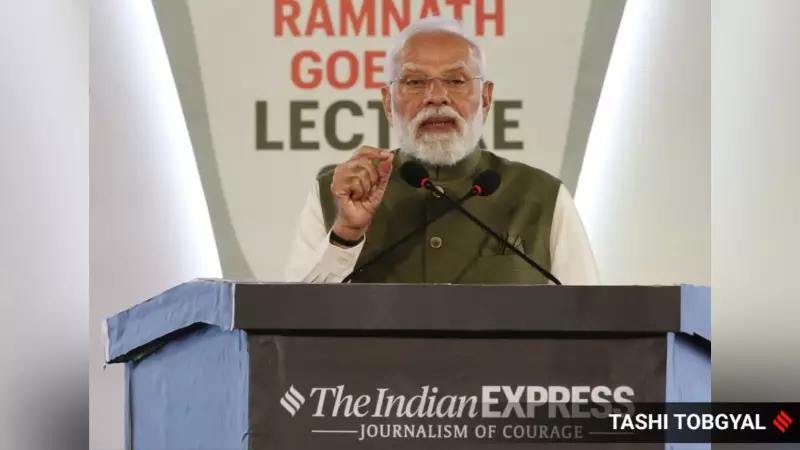
Prime Minister Narendra Modi delivered a powerful address at the sixth Ramnath Goenka Lecture in New Delhi on Monday, outlining an ambitious vision for India to completely shed its colonial mindset within the next decade. Speaking at the event that honored the Express Group founder's legacy, the Prime Minister set 2035 as the target year to eliminate what he described as the lingering psychological impact of British colonial policies.
The Colonial Legacy and Macaulay's Impact
In his landmark speech, Prime Minister Modi specifically pointed to Thomas Babington Macaulay's 1835 education policy as the root cause of India's colonial mindset. The Prime Minister explained that Macaulay deliberately designed a system to create Indians who looked Indian but thought like the British, fundamentally damaging India's indigenous knowledge systems while imposing foreign educational frameworks.
"India paid a heavy price for this," Modi emphasized, noting that this policy ingrained the belief that Western or foreign ideas and products were inherently superior. The consequence was that generations of Indians looked abroad for innovation and considered imported goods and concepts better than domestic alternatives.
Vision for a Decolonized India
The Prime Minister declared that by 2035, exactly 200 years after Macaulay's policy implementation, India would finally put a lock on this colonial mentality. He clarified that his position wasn't against the English language specifically, but rather aimed at promoting Indian languages and cultural confidence.
Modi highlighted India's new education policy as a crucial step in this direction, emphasizing its focus on mother tongues and indigenous knowledge systems. He drew parallels with other nations that take pride in their native languages while still engaging with global knowledge.
Political Reflections and Broader Vision
The Prime Minister used the platform to address recent political developments, including the NDA's victory in Bihar elections. He cautioned state governments that their current political approaches would determine their future viability, specifically mentioning that Bihar voters haven't forgotten what he termed the "jungle raj" era under Lalu Prasad Yadav.
Responding to media commentary about his government being in perpetual "election mode," Modi countered that his approach was actually about being in "emotion mode" – consistently working for the welfare of the poor. He criticized some political parties for allegedly working for their own interests under the guise of social justice, contrasting this with what he described as actual social justice: approximately 94 crore Indians now covered by social security networks.
Security and Economic Achievements
Prime Minister Modi also addressed national security concerns, asserting that the footprint of Maoism is continuously shrinking across India. He accused the Congress party of previously promoting Naxalism even in urban areas, controversially describing the current opposition as the "Muslim League Maoist Congress."
On economic performance, the Prime Minister highlighted India's resilience during global challenges, noting that India maintains a growth rate of approximately 7% despite worldwide economic struggles following the COVID-19 pandemic. "At a time when the world is fearful of disruption, India is confidently moving in the direction of a bright future," he stated.
Tribute to Ramnath Goenka's Legacy
Throughout his address, Prime Minister Modi paid rich tribute to Ramnath Goenka, recalling the media baron's courageous stands during critical historical moments. He noted that Goenka supported the Congress during the freedom struggle but chose not to print newspapers rather than submit to British dictates during the Quit India Movement.
The Prime Minister highlighted Goenka's diverse political engagements, including his support for the JP movement, association with the Janata Party during Emergency days, and even his candidacy as a Jana Sangh candidate from Vidisha. Modi described Goenka as establishing the Express Group not merely as a newspaper but as a mission, citing the famous blank editorial published to protest against the Emergency as an example of his courageous journalism.
Modi revealed that Goenka drew inspiration from a Bhagavad Gita shloka advising to wage war for duty without concern for personal gain or loss. The Prime Minister also recalled Goenka's assistance to Sardar Patel during the Hyderabad liberation movement and his support for Nanaji Deshmukh and Jayaprakash Narayan during the JP movement.
Contemporary Relevance and Global Position
In his concluding remarks, Prime Minister Modi described today's India as "restless to become developed," much like Ramnath Goenka was "restless in a positive sense." He made the significant declaration that India is not just an emerging market but also an emerging model for the world to follow.
The event also featured addresses from Viveck Goenka, Chairman and Managing Director of The Indian Express Group, who connected Modi's vision for Atmanirbhar Bharat with Ramnath Goenka's conviction that the Indian mind must never outsource its courage or thinking. Anant Goenka, Executive Director of the group, emphasized that balanced journalism giving space to all perspectives remains relevant, as evidenced by The Indian Express reaching 200 million monthly users.
Anant Goenka also supported the Prime Minister's decolonization pitch by noting how Sanskrit once spread across Asia through the power of ideas rather than conquest. The Ramnath Goenka Lecture series has previously featured notable speakers including Marianne Pearl, RBI Governor Dr Raghuram Rajan, President Pranab Mukherjee, Chief Justice Ranjan Gogoi, External Affairs Minister Dr S Jaishankar, and technologist Bill Gates.





